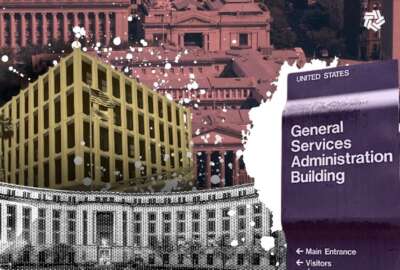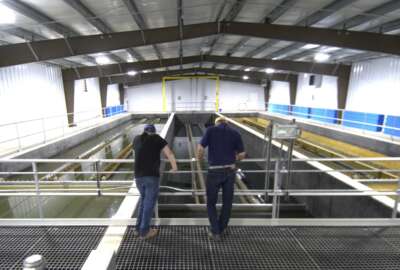Federal buildings officials say the FBI needs a new headquarters building to replace the “obsolete” and “failing” J. Edgar Hoover (JEH) Building in downtown Washington, D.C.
But even in a best-case scenario, it’ll take more than a decade for FBI employees to relocate to a new suburban headquarters, according to the Biden administration’s latest plans.
The General Services Administration, according to a recently posted prospectus, expects to begin construction on the new FBI headquarters in 2029, and have FBI employees working out of the new space by 2036.
GSA states in its prospectus that the Hoover building is “obsolete,” and that its IT infrastructure has “reached capacity with limitations for further expansion.”
“JEH was not designed to support today’s FBI mission that includes an increased emphasis on national security and other emerging threats,” the agency wrote.
The Biden administration announced last November its plans to construct a new suburban headquarters for the FBI in Greenbelt, Maryland. Congress approved $200 million for the project in a comprehensive spending deal for the rest of fiscal 2024.
Nick Dimos, the assistant director of the FBI’s Finance and Facilities Division, told members of the House Transportation and Infrastructure Committee on Wednesday that the “failing” Hoover building no longer meets the needs of the FBI workforce and that “we need a long-term solution for our headquarters facility.”
“The risk of doing nothing to protect our people and sensitive information is too great — with continued pipe bursts, concrete instability, and failing heating and cooling equipment at JEH,” Dimos told the subcommittee on economic development, public buildings and emergency management.
Dimos told lawmakers last December that parts of the Hoover building are dropping onto employees’ workspaces and equipment, and that the FBI spent $75 million since 2011 to avoid a “catastrophic” breakdown of its water infrastructure.
The FBI, he added, is also looking to harden its security at facilities nationwide.
“Standard office space does not meet the needs of our special agents, intelligence analysts, scientists and other professionals,” he said. “The FBI requires command centers, interview rooms, space for seized drug evidence, weapons vaults, computer forensics laboratories, automotive bays for SWAT vehicles, and space to house equipment for the FBI’s chemical, biological, radiological, nuclear and explosives response mission.”
Dimos said the agency needs vehicle barriers to protect its employees and facilities — noting that an individual was arrested last week after ramming into the gate of the FBI’s Atlanta field office.
“Hostile actors seek to cause harm to FBI personnel and facilities and exfiltrate sensitive information,” he said.
GSA’s inspector general is looking into the site selection process for the FBI’s new suburban headquarters. That’s after Virginia lawmakers and FBI Director Chris Wray raised concerns about how GSA picked Greenbelt from a list of three sites.
Wray told employees in an email immediately following GSA’s announcement that he had “concerns about fairness and transparency in the process and GSA’s failure to adhere to its own site selection plan.”
“Our process concerns remain, they have not changed,” Dimos said. “And so we continue to await the findings of GSA’s OIG so that we can see their complete review and analysis of the process concerns that we’ve put forward.”
A new suburban headquarters would bring together FBI employees from the J. Edgar Hoover Building in downtown D.C. and eight other leased facilities across the metro area.
The Biden administration expects the FBI headquarters in Greenbelt will accommodate at least 7,500 FBI employees and would give the agency more opportunity to reduce leased office space in the D.C. area.
Over the past five years, the FBI has consolidated 10 leases in the National Capital region alone, totaling nearly $24 million in annual rent savings.
“We have relocated many assets outside of the National Capital Region. And yet certain functions must remain in the D.C. area. Which is why the new headquarters project is critically important to us,” Dimos said.
The FBI headquarters is just a part of the agency’s sprawling national footprint. It also occupies 56 field offices and more than 350 satellite offices. All told, the agency accounts for more than 12 million square feet of space.
Elliot Doomes, commissioner of GSA’s Public Buildings Service, said the FBI in October 2020 eliminated two leased buildings in New York City and reduced total space needs by 50,000 square feet by consolidating into the Javits Federal Building — leading to $13 million in cost savings.
The FBI also renovated space in the Willam J. Green Federal Building in Philadelphia, allowing the FBI to eliminate another two leased facilities — eliminating 31,000 square feet of space and saving $840,000 in rent costs.
“GSA’s intent is to deliver the highest quality facilities for the FBI while maintaining our agency goals of optimizing the federal footprint,” Doomes said.
The FBI has moved thousands of its employees out of the Washington, D.C. metro area over the past decade, and built up its presence at other campuses across the country.
Subcommittee Chairman Scott Perry (R-Pa.) said the cost of a new FBI headquarters has “ballooned” from an estimated $3 billion to $4.5 billion.
Meanwhile, GSA and the FBI are looking for a federally owned site in D.C. to accommodate an additional 750-1,000 FBI personnel who would support day-to-day FBI engagement with the Justice Department, Congress and the White House.
“The bottom line is the FBI’s space footprint is massive and costly,” Perry said. “We have an opportunity here to make sure we don’t overbuild and over-lease for the FBI and save the taxpayer potentially billions of dollars.”
The Biden administration, in its 2025 budget request, asked for $3.5 billion for a new FBI headquarters in Greenbelt, Maryland.
To support the funding for a new FBI headquarters, the Biden administration proposes setting up a Federal Capital Revolving Fund.
Under this proposal, Congress would appropriate the total amount of money needed for the project upfront. GSA would then repay the revolving fund, over the course of 15 years, by taking out about $233 million each year from the Federal Buildings Fund.
Congress already appropriated about $845 million for a new FBI headquarters.
Copyright
© 2024 Federal News Network. All rights reserved. This website is not intended for users located within the European Economic Area.





